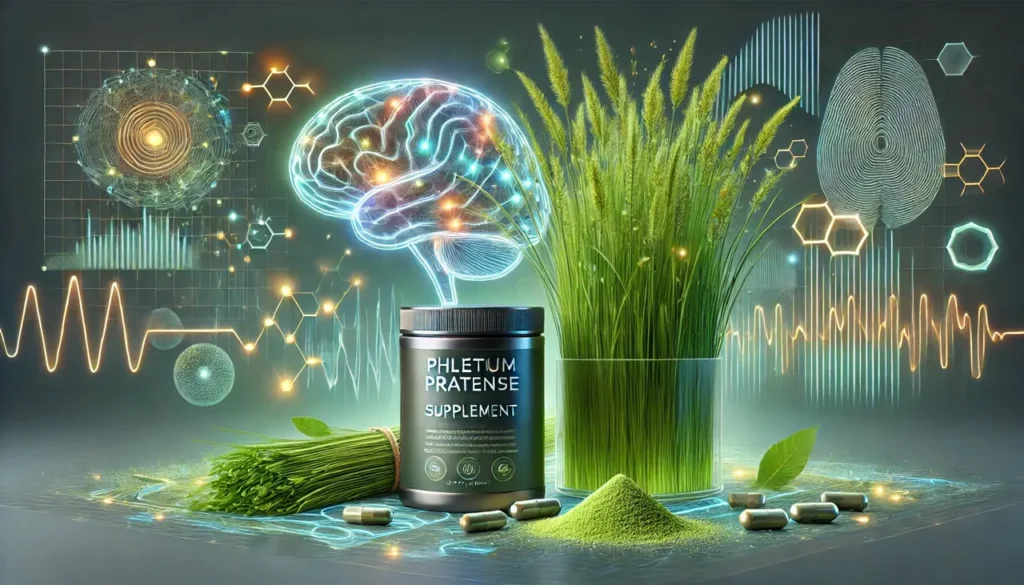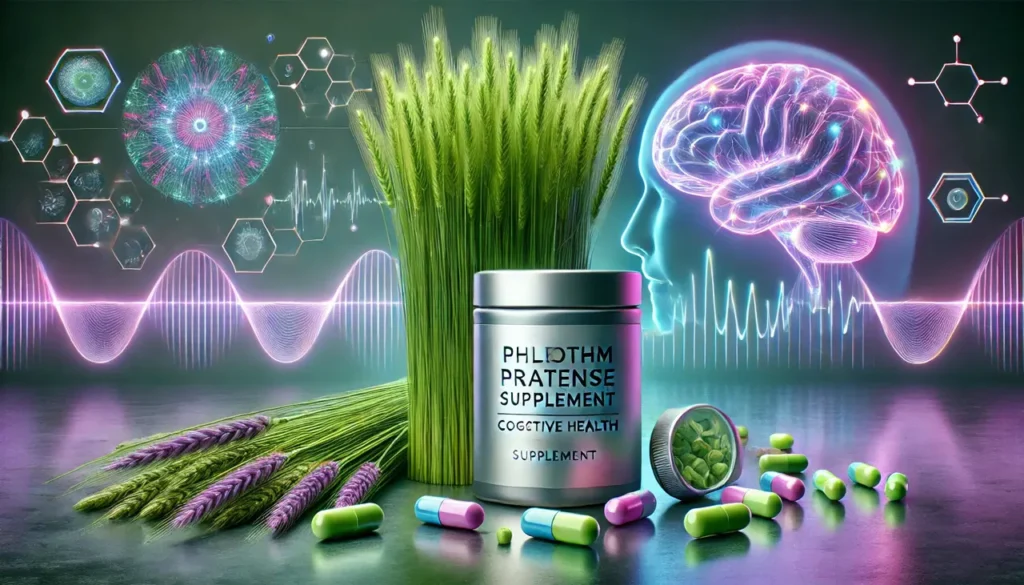Phleum pratense, commonly known as Timothy grass, is primarily recognized as a widespread perennial grass used in agriculture for hay production and livestock feed. However, in recent years, there has been growing interest in exploring its potential nootropic benefits. While more commonly associated with respiratory allergies due to its pollen, Phleum pratense may possess unique bioactive compounds that have drawn attention for their possible roles in brain health and cognitive enhancement.
This article provides a detailed examination of Phleum pratense, its bioactive components, potential nootropic effects, appropriate dosages, safety considerations, side effects, and interactions with other drugs and supplements. While Phleum pratense is not traditionally classified as a nootropic supplement, its bioactive components might have implications for brain health.
You May Also Like:
Sources and Chemistry of Phleum Pratense
Phleum pratense is native to Europe and Asia and is now widely grown across the globe. The plant grows well in temperate climates, especially in moist and fertile soil, and is a valuable source of hay and silage for livestock. While it is primarily used in agriculture, recent scientific interest has shifted toward its potential medicinal properties.
The bioactive components of Phleum pratense that may have physiological effects include a variety of phytochemicals. Some of these are flavonoids and alkaloids, both of which are known to influence brain chemistry. Additionally, Phleum pratense contains certain polysaccharides and phenolic compounds that may contribute to its potential neuroprotective properties. However, the exact chemistry and how these compounds interact with human physiology remain under investigation.
The mechanisms through which Phleum pratense may exert cognitive benefits are not yet fully elucidated, but it is hypothesized that the plant’s phytochemicals may influence neurotransmitter regulation, reduce oxidative stress, and modulate inflammatory pathways. These processes are crucial in maintaining brain function and cognitive health.

Physiological Mechanisms of Phleum Pratense in the Body and Brain
Phleum pratense has been studied primarily for its role in allergy treatments, specifically in sublingual immunotherapy (SLIT), aimed at reducing allergic reactions caused by its pollen. However, several compounds found in Phleum pratense may impact brain function by reducing oxidative stress and inflammation, both of which are implicated in cognitive decline and neurodegenerative diseases.
The phenolic compounds in Phleum pratense, for instance, are known for their antioxidant properties. By scavenging free radicals, they may protect neurons from oxidative damage, which is a major contributor to aging and neurodegenerative conditions such as Alzheimer’s and Parkinson’s diseases. Furthermore, some studies suggest that specific flavonoids in the plant may promote healthy blood flow to the brain, supporting cognitive function.
Moreover, the anti-inflammatory effects of the bioactive compounds in Phleum pratense may help reduce neuroinflammation, which has been increasingly recognized as a key factor in cognitive impairment and mental health disorders. By modulating inflammatory pathways, Phleum pratense may support brain health, particularly in individuals prone to inflammation-driven cognitive decline.

Potential Nootropic Benefits of Phleum Pratense
Though Phleum pratense is not widely recognized as a nootropic supplement, some of its bioactive components suggest that it could offer benefits related to cognitive function. These include:
· Neuroprotection Against Oxidative Stress: The plant’s phenolic and flavonoid content can help protect brain cells from oxidative damage. Since oxidative stress is closely linked to cognitive decline, especially in aging populations, Phleum pratense’s antioxidant properties may help slow this process, potentially protecting memory and learning abilities over time.
· Improved Brain Circulation: Some flavonoids found in Phleum pratense may promote better circulation, including to the brain. Enhanced cerebral blood flow is crucial for optimal brain function as it ensures that neurons receive an adequate supply of oxygen and nutrients, supporting mental clarity and cognitive performance.
· Anti-Inflammatory Effects on Brain Health: Chronic inflammation is a known contributor to cognitive impairments and neurodegenerative diseases. Phleum pratense’s anti-inflammatory compounds could help reduce neuroinflammation, making it potentially useful for preserving brain health and protecting against conditions such as Alzheimer’s disease.
· Potential Mood Enhancement: Although not directly studied in the context of Phleum pratense, its antioxidant and anti-inflammatory effects may indirectly support mood regulation. As oxidative stress and inflammation are linked to mood disorders like depression, compounds that counteract these pathways may have mood-enhancing benefits.
· Cognitive Flexibility Support: Some research suggests that certain flavonoids may enhance cognitive flexibility, which is the ability to adapt one’s thinking and behavior in response to new and unexpected conditions. By potentially promoting synaptic plasticity, Phleum pratense could contribute to improved cognitive adaptability and problem-solving skills.
· Memory Enhancement: Preliminary studies on other plants with similar phytochemical profiles suggest that flavonoids may facilitate synaptic transmission and support long-term potentiation (LTP), processes essential for memory formation. Although specific studies on Phleum pratense are lacking, its rich flavonoid content indicates a potential for enhancing memory functions.
While these possible benefits are promising, it is essential to emphasize that research specifically exploring the nootropic effects of Phleum pratense is still in its early stages. More comprehensive studies are needed to determine its efficacy and safety as a cognitive enhancer.

Dosage and Supplementation Guidelines
Since Phleum pratense is not commonly marketed as a nootropic supplement, standardized dosing for cognitive enhancement is not well-established. However, there are general guidelines for its use in other contexts, such as in allergy treatments.
- Allergy Treatment Dosage: Phleum pratense is commonly used in sublingual immunotherapy for allergy desensitization. Doses for this purpose are typically determined by medical professionals, and the use of the plant in this form is aimed at reducing allergic reactions to its pollen.
- Nootropic Supplementation: If Phleum pratense becomes commercially available as a nootropic supplement in the future, doses would likely depend on the concentration of its active bioactive components. For similar herbal nootropic supplements, doses can range between 500 mg and 2,000 mg per day, but it is crucial to consult with a healthcare provider to determine an appropriate and safe dosage.
- Form and Delivery: As a supplement, Phleum pratense may be available in capsule, tablet, or liquid extract forms. However, individuals using it for cognitive purposes should only do so under medical supervision due to the limited research on its effectiveness and safety as a nootropic.
Support Stress Relief and Brain Health with Powerful Rhodiola Rosea—Order Today on Amazon!

Side Effects and Safety
Phleum pratense is generally considered safe when used appropriately, especially in its common use for allergy immunotherapy. However, there are several considerations and potential side effects to be aware of:
- Allergic Reactions: Phleum pratense is a known allergen, particularly its pollen. Individuals who are allergic to grasses or who suffer from hay fever may experience adverse reactions such as sneezing, runny nose, or even more severe allergic responses. For these individuals, supplementation with Phleum pratense may exacerbate their symptoms.
- Digestive Upset: As with many herbal supplements, Phleum pratense could cause digestive issues in some individuals, including nausea, bloating, or diarrhea. These effects are typically mild but can be uncomfortable for sensitive users.
- Respiratory Symptoms: Some individuals, especially those with existing respiratory conditions such as asthma, may find their symptoms worsened by exposure to Phleum pratense pollen, even when ingested in supplement form.
- Potential Drug Interactions: Given that Phleum pratense has bioactive compounds that could affect inflammation and oxidative stress, there is a potential for interactions with other supplements and medications. For instance, individuals on blood thinners, anti-inflammatory drugs, or medications for mood disorders should be cautious when considering supplementation with Phleum pratense.
Interactions with Other Supplements and Drugs
While specific drug interactions with Phleum pratense have not been well-documented, it is prudent to approach this supplement with caution due to its bioactive compounds. Potential interactions include:
- Anticoagulants (Blood Thinners): The flavonoids in Phleum pratense may have mild blood-thinning properties, which could enhance the effects of anticoagulant medications such as warfarin. Individuals taking such drugs should consult their healthcare provider before starting supplementation.
- Anti-Inflammatory Drugs: Phleum pratense contains compounds that may reduce inflammation. If taken with nonsteroidal anti-inflammatory drugs (NSAIDs) like ibuprofen or aspirin, there could be a risk of enhanced anti-inflammatory effects, which might lead to complications such as gastrointestinal issues or excessive bleeding.
- Supplements with Similar Effects: If combined with other nootropic supplements known for their antioxidant or anti-inflammatory effects, such as resveratrol, curcumin, or omega-3 fatty acids, Phleum pratense may amplify these effects. While this could be beneficial, it also increases the risk of side effects or unwanted interactions.
Risks for Individuals with Certain Health Conditions
Certain individuals should avoid using Phleum pratense supplements or approach them with caution:
- Allergies to Grass Pollen: People with known allergies to grass pollen, particularly Timothy grass, should avoid this supplement due to the risk of exacerbating allergic reactions.
- Asthma and Respiratory Conditions: Individuals with asthma or other respiratory conditions may experience worsened symptoms if exposed to Phleum pratense, particularly if they are allergic to it.
- Pregnant and Nursing Women: Due to the lack of sufficient research on the safety of Phleum pratense for pregnant or nursing women, it is advisable for these individuals to avoid supplementation unless explicitly recommended by a healthcare provider.
Relax Your Mind and Body for Better Sleep with High-Quality Supplements—Buy Today on Amazon!
Conclusion: Should You Consider Phleum Pratense as a Nootropic?
Phleum pratense presents intriguing possibilities as a nootropic supplement, largely due to its antioxidant and anti-inflammatory properties. However, it is not yet widely recognized or studied for its cognitive benefits. While there is potential, particularly concerning neuroprotection and enhanced circulation, more research is needed to confirm its efficacy in this domain.
Individuals interested in exploring Phleum pratense as a nootropic should proceed with caution, especially those with allergies or existing health conditions. Consultation with a healthcare provider is essential to ensure safety and proper dosage. Given the current lack of substantial evidence supporting its cognitive-enhancing effects, Phleum pratense may be better suited for its traditional uses in agriculture and allergy management than as a mainstream nootropic at this time.

References:
- Phleum pratense (timothy grass) . Retrieved from: https://www.cabidigitallibrary.org/doi/full/10.1079/cabicompendium.40248
- Phleum Pratense . Retrieved from: https://www.rxlist.com/supplements/phleum_pratense.htm
- Oxidative Stress and Cognitive Decline: The Neuroprotective Role of Natural Antioxidants . Retrieved from: https://pmc.ncbi.nlm.nih.gov/articles/PMC8548611/
Important Note: The information contained in this article is for general informational purposes only, and should not be construed as health or medical advice, nor is it intended to diagnose, prevent, treat, or cure any disease or health condition. Before embarking on any diet, fitness regimen, or program of nutritional supplementation, it is advisable to consult your healthcare professional in order to determine its safety and probable efficacy in terms of your individual state of health.
Regarding Nutritional Supplements Or Other Non-Prescription Health Products: If any nutritional supplements or other non-prescription health products are mentioned in the foregoing article, any claims or statements made about them have not been evaluated by the U.S. Food and Drug Administration, and such nutritional supplements or other health products are not intended to diagnose, treat, cure, or prevent any disease.


